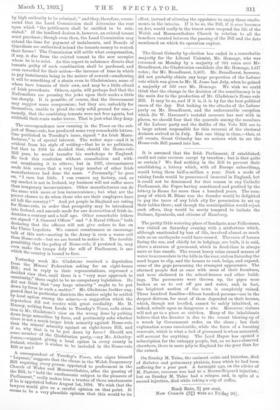The correspondence now running in the Times on the sub-
ject of Home-rule, has produced some very remarkable letters. One published in Tuesday's issue, signed "An Irish Manu- facturer," is of special interest. The writer says—and it is evident from his style of writing—that he is no politician, but that in 1886 be decided that, should the Home-rule Bill pass, he would transfer his workshops to England. He took this resolution without consultation and with- out mentioning it to others ; but in 1887, circumstances made him aware that a very large number of other Irish manufacturers had done the same. "Personally," be goes "en, "I care but little. I can remove my factory, and, as my market is not in Ireland, my business will not suffer more than temporary inconvenience. Other manufacturers can do the same with more or less inconvenience ; but what are the Poorer classes to do when those who are their employers have all left the country P " And yet people in England are voting for Home-rule, in order that prosperity may be introduced into Ireland, and amends made for our destruction of Irish in- dustries a century and a half ago. Other remarkable letters are signed "A General Officer" and "A Naval Officer," both declaring that the officers will not give orders to fire on the Ulster Loyalists. We cannot countenance or encourage talk of this sort—mutiny in the Army is even a worse evil than Home-rule—but we are bound to notice it. The terrible possibility that the policy of Home-rule, if persisted in, may even make the troops defy the will of Parliament, is one which the country is bound to face.


































 Previous page
Previous page